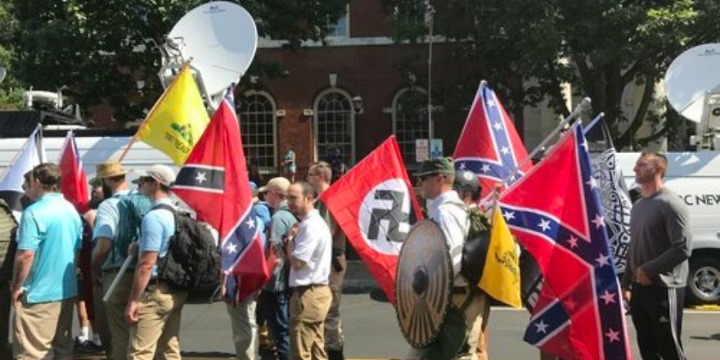Civil War Antisemitism
 by Harold Brackman
by Harold Brackman

White supremacist protesters carry Nazi and Confederate flags in Charlottesville, Va., on Aug. 12, 2017. Photo: Anthony Crider via Wikimedia Commons.
The Civil War, the most polarizing time in US history until today, was very much a part of the American Jewish experience. In 1860, in a national population of 31 million, there were 150,000 Jews; two-thirds were recent immigrants. About 25,000 Jews lived in the South, many in New Orleans. Like some other Southerners, most Jews did not own slaves.
A large majority of Southern Jewish men voluntarily enlisted in the Confederate Army, just as their Northern counterparts did in the Union Army. The pre-war South was a closed society. Differences of religion could be tolerated — but not dissenting views on slavery. There were Southern-born Jews who were anti-slavery, like Charleston-born Abram J. Dittenhoefer, but he became an influential Republican only after his family moved to New York City.
The Union North and Confederate South had this much in common: antisemitism.
One infamous Civil War episode, analyzed by Jonathan Sarna’s recent book, involved General Ulysses S. Grant’s General Orders No. 11 in December 1862, expelling “Jews as a class” from the military department of Tennessee.
Grant and his commanders contended with a rapscallion assortment of Confederate agents, dishonest Union officers, and smugglers of all denominations. They bought embargoed Southern cotton at low prices, paying in gold and war materiel. Then they sold the cotton in the North at inflated prices. Unscrupulous merchants profited while Confederate armies got scarce supplies.
Grant’s problem was real, but punishing all Jews for the conduct of a handful was antisemitic. As he prepared the Emancipation Proclamation, President Lincoln rescinded Grant’s orders because they should have been limited to “a few sinners.” General-in-Chief Henry Halleck authorized the expulsion of some “Jew traders,” but Grant instead apologized; later as president, he denounced Russian pogroms. His conscience, his wife and Jewish lobbying each influenced him.
There was also widespread wartime disparagement of Jewish businessmen for “shoddy” goods, starting with military uniforms. Jewish manufacturers and merchants were tarred by antisemites as “shoddy” war profiteers.
In the South, German Jewish immigrants were widely despised as “Christ killers.” The situation worsened after war erupted. Then, Judah P. Benjamin, who was credited as President Jefferson Davis’ “brain” but also reviled as “Judas Iscariot Benjamin,” became a leading scapegoat. A Jew only in his Sephardic pedigree, Benjamin was born in the Danish West Indies, married a New Orleans heiress and had his daughters raised Catholic. He never had anything to do with his family’s ancestral faith. The citizens of Talbotton and Thomasville, Georgia went to the extreme of resolving that all Jews were disloyal and should be expelled from their towns.
With peace at Appomattox, antisemitic pressures receded everywhere. But nowhere did Jews forget their wounds, just as North and South remained unreconciled for generations after Lincoln’s martyrdom.
Historian Harold Brackman is coauthor with Ephraim Isaac of From Abraham to Obama: A History of Jews, Africans, and African Americans (Africa World Press, 2015).
 Iran Sentences Rapper Toomaj Salehi to Death Over 2022-23 Unrest
Iran Sentences Rapper Toomaj Salehi to Death Over 2022-23 Unrest Netanyahu: ‘Antisemitic Mobs Have Taken Over Leading U.S. Universities’
Netanyahu: ‘Antisemitic Mobs Have Taken Over Leading U.S. Universities’ U.S. Decides Against Sanctions on IDF’s Netzah Yehuda Battalion
U.S. Decides Against Sanctions on IDF’s Netzah Yehuda Battalion Israel Says It Is Poised to Move on Rafah
Israel Says It Is Poised to Move on Rafah Israeli Hostage Hersh Goldberg-Polin Seen Alive in a New Hamas Video
Israeli Hostage Hersh Goldberg-Polin Seen Alive in a New Hamas Video Palestinian Prime Minister Announces New Reform Package
Palestinian Prime Minister Announces New Reform Package France: Man Suspected of Abducting, Raping Jewish Woman ‘to Avenge Palestine’
France: Man Suspected of Abducting, Raping Jewish Woman ‘to Avenge Palestine’ Israel Intensifies Strikes Across Gaza, Orders New Evacuations in North
Israel Intensifies Strikes Across Gaza, Orders New Evacuations in North Iran Threatens to Annihilate Israel Should It Launch a Major Attack
Iran Threatens to Annihilate Israel Should It Launch a Major Attack ‘Completely Baseless’: Reports of Mass Graves at Gaza Hospitals are False, IDF Says
‘Completely Baseless’: Reports of Mass Graves at Gaza Hospitals are False, IDF Says



 Israeli Hostage Hersh Goldberg-Polin Seen Alive in a New Hamas Video
Israeli Hostage Hersh Goldberg-Polin Seen Alive in a New Hamas Video Israel Says It Is Poised to Move on Rafah
Israel Says It Is Poised to Move on Rafah U.S. Decides Against Sanctions on IDF’s Netzah Yehuda Battalion
U.S. Decides Against Sanctions on IDF’s Netzah Yehuda Battalion Netanyahu: ‘Antisemitic Mobs Have Taken Over Leading U.S. Universities’
Netanyahu: ‘Antisemitic Mobs Have Taken Over Leading U.S. Universities’ Iran Sentences Rapper Toomaj Salehi to Death Over 2022-23 Unrest
Iran Sentences Rapper Toomaj Salehi to Death Over 2022-23 Unrest